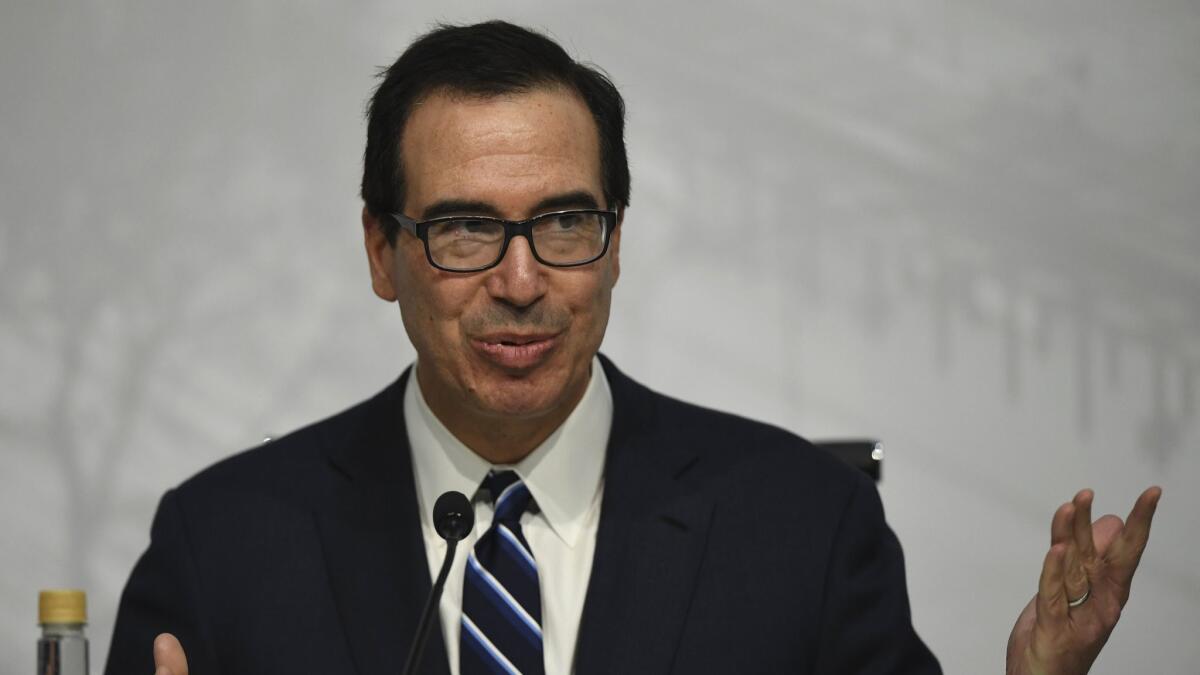Some small business owners could avoid cap on state and local tax deduction after IRS clarifies new rules

- Share via
Reporting from Washington — Small business owners could avoid a new federal limit on state and local tax deductions after the Internal Revenue Service said Wednesday that rules it released last month to prevent efforts in California and other states to circumvent the cap apply only to individuals.
Businesses will be allowed to claim a full federal tax deduction for contributions to charities or government programs — particularly those offering school choice scholarships — that offer state tax credits, the IRS said.
The IRS’ Aug. 23 rules cracked down on that option for individual filers after some high-tax states moved to turn state and local tax payments into deductible charitable contributions so residents could avoid the $10,000 cap on state and local tax deductions in the Republican tax law that took effect Jan. 1.
Those states — which also include New York, New Jersey and Connecticut — are controlled by Democrats, and officials there objected to the cap as a partisan move to penalize their residents.
But the IRS ran into problems from a Republican constituency when it issued the rules last month.
There are more than 100 charitable tax-credit programs in dozens of states — including red ones such as Alabama, Arizona, Georgia and South Carolina — that could be adversely affected by the new rules. Many of those programs offer tax credits for contributions to fund private school scholarships.
School choice advocates objected to the IRS rules, which reduced the federal tax incentive for contributions to such programs.
On Wednesday, the IRS clarified that so-called pass-through businesses, whose owners file taxes through the individual code, could take a full deduction for such contributions because they still qualify as a business expense.
The IRS rules, likely to be in place by the end of the year, said individual filers had to reduce the federal charitable tax deduction they would claim by the amount of any credit they receive on their state and local taxes.
“The IRS clarification makes clear that the long-standing rule allowing businesses to deduct payments to charities as business expenses remains unchanged under the Tax Cuts and Jobs Act,” Treasury Secretary Steven T. Mnuchin said Wednesday.
“The recent proposed rule concerning the cap on state and local tax deductions has no impact on federal tax benefits for business-related donations to school choice programs,” he said.
The clarification means that pass-through business owners now could use contributions to those types of tax-credit programs to reduce their federal tax liability in a way that individuals cannot. The $10,000 cap does not apply to corporations.
Pass-throughs include small businesses such as mom-and-pop operations, but also privately held manufacturers and large partnerships such as law firms and hedge funds.
“There’s potentially the opportunity for partnerships or some other pass-through businesses to claim deductions above what they’d be able to do with the capped state and local tax deduction,” said Jared Walczak, a senior policy analyst at the conservative-leaning Tax Foundation.
California state Sen. Kevin de León (D-Los Angeles), who has been pushing legislation allowing residents to work around the cap, criticized the latest IRS move.
“This just shows how poorly thought out this proposed regulation is and what’s really driving it, partisan efforts to punish states like California that didn’t vote for [President] Trump,” he said. “Worse, they seem to be encouraging private school donations while denying those same benefits to our public schools and universities. Mr. Mnuchin is making such a mess of this, Congress may have no alternative but to step in and repeal the state and local tax deduction cap.”
De León’s bill, which passed the state Legislature and awaits Gov. Jerry Brown’s signature, would allow California residents to circumvent the $10,000 deduction limit through a 75% tax credit for donations to an existing state program that funds college tuition scholarships.
Similar legislation has been enacted in New York and other states. De Leon and New York Gov. Andrew Cuomo, also a Democrat, have threatened to sue to block the IRS rules.
Twitter: @JimPuzzanghera
More to Read
Inside the business of entertainment
The Wide Shot brings you news, analysis and insights on everything from streaming wars to production — and what it all means for the future.
You may occasionally receive promotional content from the Los Angeles Times.











